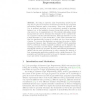Free Online Productivity Tools
i2Speak
i2Symbol
i2OCR
iTex2Img
iWeb2Print
iWeb2Shot
i2Type
iPdf2Split
iPdf2Merge
i2Bopomofo
i2Arabic
i2Style
i2Image
i2PDF
iLatex2Rtf
Sci2ools
117
click to vote
LPNMR
2001
Springer
2001
Springer
Multi-dimensional Dynamic Knowledge Representation
Abstract. According to Dynamic Logic Programming (DLP), knowledge may be given by a sequence of theories (encoded as logic programs) representing different states of knowledge. These may represent time (e.g. in updates), specificity (e.g. in taxonomies), strength of updating instance (e.g. in the legislative domain), hierarchical position of knowledge source (e.g. in organizations), etc. The mutual relationships extant among states are used to determine the semantics of the combined theory composed of all the individual theories. Although suitable to encode a single dimension (e.g. time, hierarchies...), DLP cannot deal with more than one simultaneously because it is defined only for a linear sequence of states. To overcome this limitation, we introduce the notion of Multidimensional Dynamic Logic Programming ( MDLP), which generalizes DLP to collections of states organized in arbitrary acyclic digraphs representing precedence. In this setting, MDLP assigns semantics to sets and sub...
Related Content
| Added | 30 Jul 2010 |
| Updated | 30 Jul 2010 |
| Type | Conference |
| Year | 2001 |
| Where | LPNMR |
| Authors | João Alexandre Leite, José Júlio Alferes, Luís Moniz Pereira |
Comments (0)

